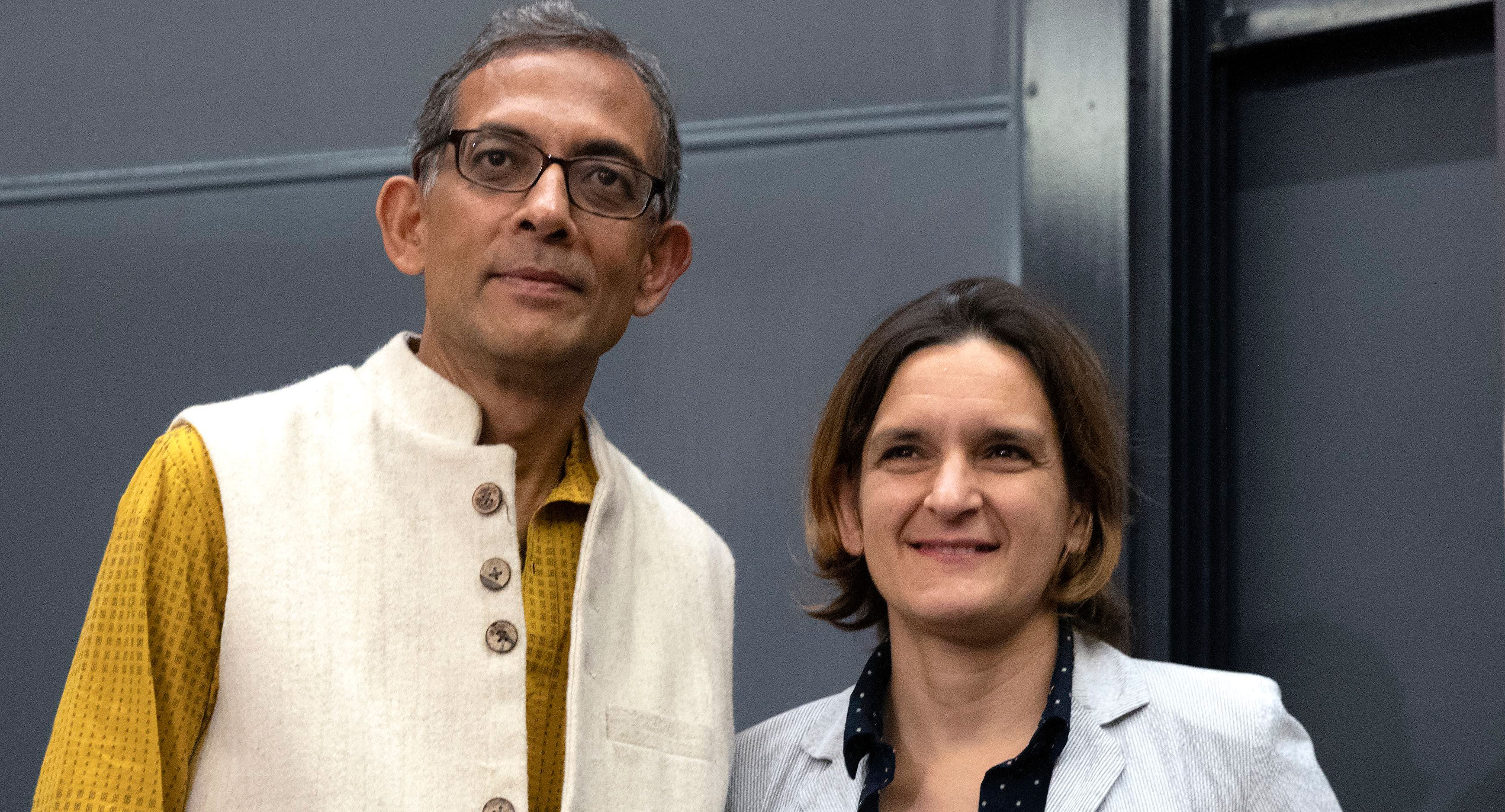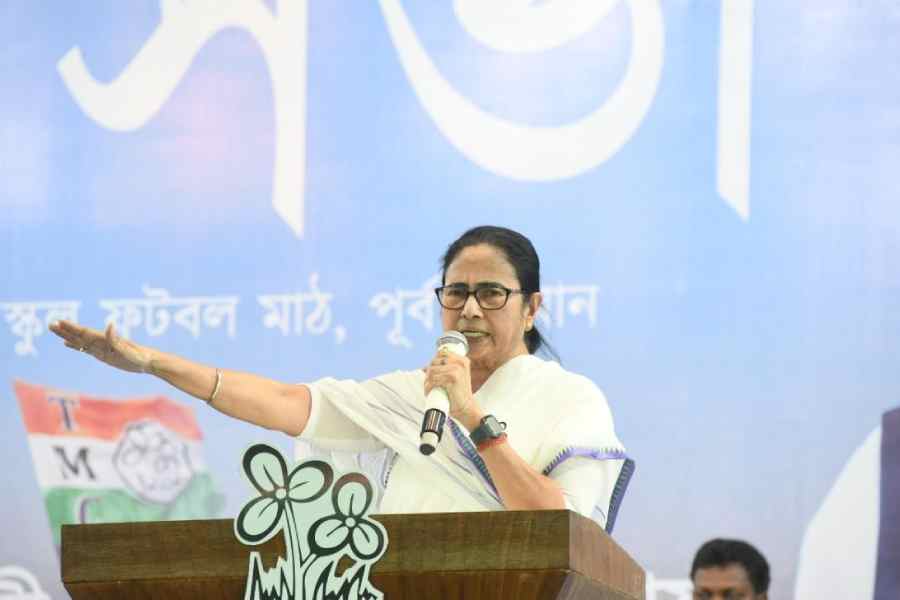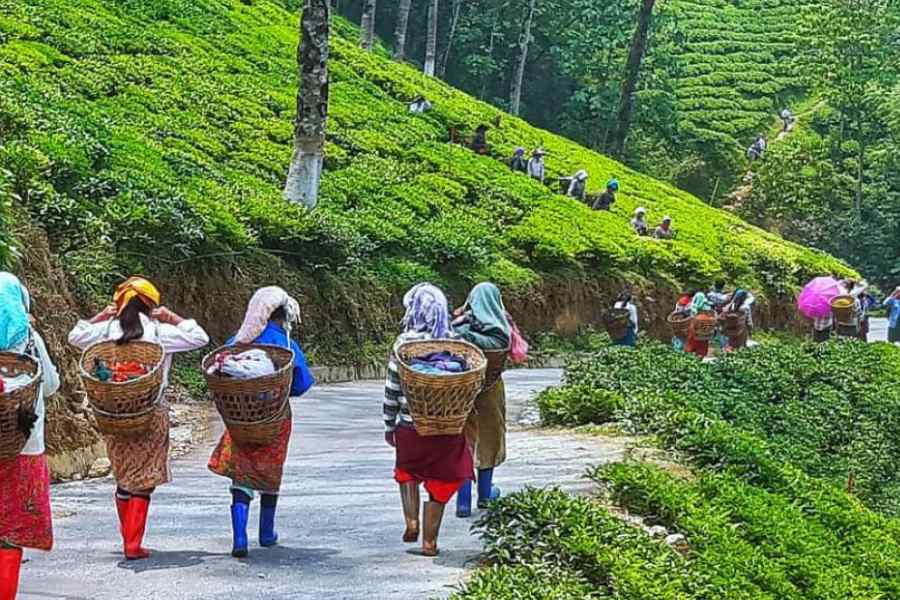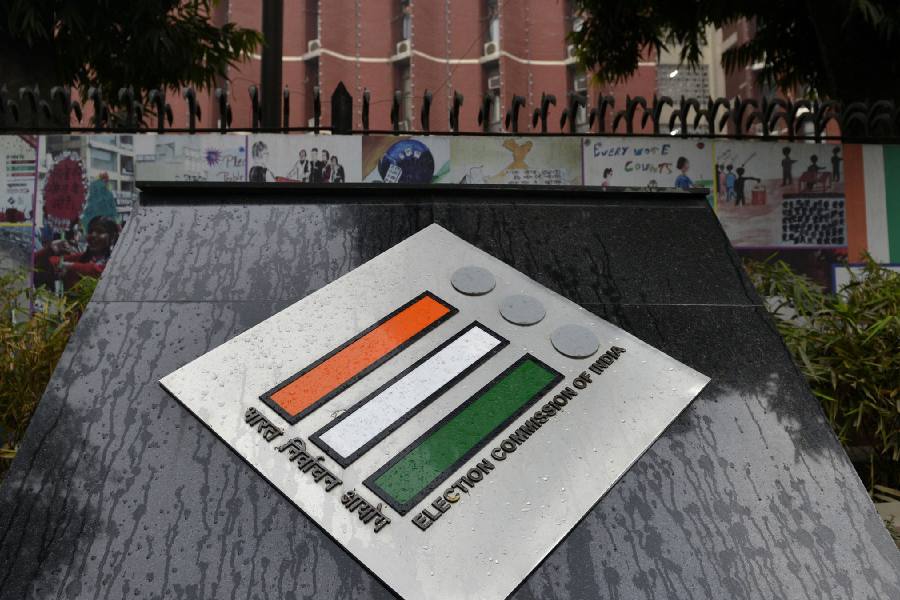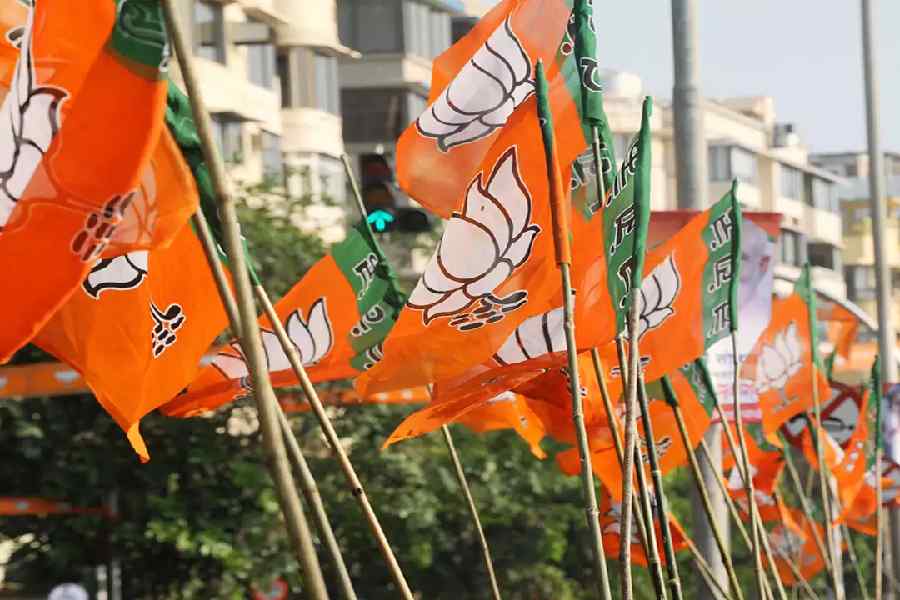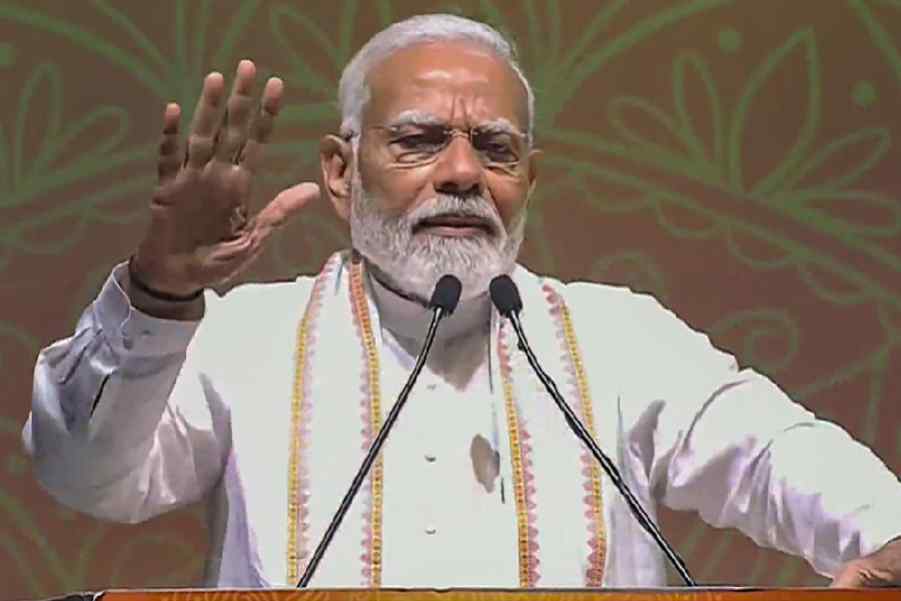Nobel laureates Abhijit Banerjee and Esther Duflo agree that the way forward from the devastating effects of the coronavirus epidemic is saving lives in the immediate future. The challenge of course is to try and ensure the efforts do not snowball into such a big economic crisis that we lose livelihoods. In a discussion with each other for #readinstead Lit Fest Dialogue organised by Juggernaut Books, the economists highlight some of the key questions confronting us now, the “uncertainties caused by uncertainties”, the unsustainability of lockdowns, difficulty in getting numbers, the case for domestic manufacture of ventilators and why India needs to “go Keynesian”.
Excerpts
AB: Hi, I am Abhijit Banerjee
ED: … and I am Esther Duflo.
AB: We are here to talk about the impact of Covid on the world economy and what we can possibly do about it. I am going to begin by asking some questions to Esther.
Esther, what do you think is the biggest, the most important problem? And I want two answers, one for right now and one for one year later.
ED: The biggest problem is for now is the savings of human lives, and in the near term it will be about getting back to work. And in the medium term to get back into the normal economy. What we are doing now to save lives must not snowball into a such a big economic crisis that we lose livelihoods.
AB: So, what do you propose to do about it?
ED: At this moment, we can listen to what the doctor says or try to make sense of what the doctor says. We know it is bad and we know we do not have a cure, and anybody who says he has a cure is lying. People are working for a cure but it will take time. All we can do is to isolate ourselves. Another thing we can do is to practice good hygiene in particular washing of hands. So if we get in contact with affected people we can prevent a transmission.
AB: It is extremely hard for people to practise such an unnatural lifestyle in the foreseeable future. For how long? People are not working, they are not earning, they are not going out, they are not meeting their loved ones. Is this a realistic enterprise for six months? Do you think that causes some challenges?
ED: It would be unsustainable for two weeks. Almost sure it would be unsustainable for six months. On the top of the uncertainties caused by the virus itself, there are uncertainties caused by the uncertainties. I am now turning the question to you. If you were in charge, of US to begin with, when would you have started this curfew and so many restrictions… you can do this, you cannot do this?
AB: It is a tough call. The model says five months and the model is based on the numbers which people plucked out from the air. Five months for full shutdown strategy. It is frightening to contemplate. A realistic (option) is to pick a shorter window and work around the peak and to make sure the peak is not as bad. Keeping the window significantly short and more focussed. I do not know which way I would have gone if I was in the hot seat because that involves making a choice that I will let some people die. More people will die in the scenario we shut it down later unless we believe that the whole thing is not sustainable. Then of course… That must be the case in many countries, because five months shutting down means people will stop believing there is a centre of policy. There is a trade-off between saving real lives and possibly at an enormous enforcement cost and enormous cost to the economy… Possibly it is easier to save the economy… I do not know. I wouldn’t say I have an easy choice there. But going back to the question, how do you know there is a modality? All of these are dependent on how many people are infected and if I am symptomatic. If there are a lot of asymptomatic infected people, we are closer to herd immunity than we think we are. If the numbers infected are closed to 100 million than a smaller number.
ED: It is difficult to get the numbers. Do we know the death figure for sure? We do not know because we could not count them very systematically. In France where I come from, anybody who dies at home is not counted (as dying from virus). Only if you die in a hospital (are you counted as someone who died from the virus).
AB: Not counted? In India anybody who dies, an elderly person will not be diagnosed.
ED: In France also, we do not know the number of deaths and we have underestimated the number of people infected. So we do not have the mortality rate. Mortality rates vary a lot and from country to country. In some countries of Europe such as Sweden, we have a mortality rate of 0.5 per cent and in Italy we have a mortality rate of 10 per cent. Everything hinges on finding out why there is a difference between the two.
The optimistic situation is with the mortality rate we can work backwards to link it with the population rate, we can (then) find out the immunity rate.
The pessimistic situation is that mortality rate reflects the poor health care in Italy. There is some truth. There aren’t enough beds in hospitals. Partly, the high mortality rate finds an explanation here.
AD: What about India?
ED: I was hoping to ask you that.
AD: Take the fraction of people seriously ill. With a country of India’s size, millions and millions of people…
ED: If we know so little of Europe and USA, we know less about India or other countries. When the weather becomes hot and humid, we do not know how it will respond. It is a new virus and we know so little about it. We know little about India too. We know about population density. We know some people have diabetes and asthma and some have blood pressure issues. There are variations in region and lifestyle. We know so little. There is pollution in Indian cities. I am told pollution affects the lungs, which adds to the problem. So we do not know how all these will affect.
AB: The good news is that India is an extremely young country. The average age is around 28.
ED: That is good news. Then there is the healthcare system, which is under a strain already and may not be able to handle additional pressure. Most people get most of the care from providers. These providers are not always qualified.
They are well meaning and do their best. But unless they are trained to identify the Covid-19 (cases) and unless they will not have the capacity…
AD: They have no ventilators.
ED: Yes, no ventilators and this is India specific scary.
AB: Across Asia.
ED: Yes but in Africa, there are few providers and people are not used to going to them. We can think of accredited providers and online training. In India there is one more step before we come to this.
AB: We do not know who they are, there is no database. They are not supposed to even exist. In West Bengal, they at decided to engage with them. But we do not know who they are. So, it is difficult to engage.
ED: May I ask a question? In West Bengal, how would you use these providers in this crisis?
AB: I will answer this question. But I would like to go back to the world economy.
Yes, we can use them. They are capable of being trained. We have seen some evidence of that. We have to train them. Many of them are on WhatsApp. We can send video to them explaining what should be done. But more important they can be used as informers who can report where the clusters are. And which are going to explode. Then the ventilators can be brought there. The current lockdown will slow down the spread. So, the reporting system will tell us which places are badly affected, and which places are not but might become infected.
We can then use the health system more effectively. A mobile SWAT team if doctors, nurses and equipment can then reach the spots based on the information.
ED: A quick question. We need equipment to test. India will be a good place to manufacture these.
AB: The property rights will have to be sorted first. Somebody should buy out these rights. Here is a billion dollar. Anybody should be able to manufacture them. It is the ideal situation for a buy-out.
ED: Back to world economics. We have seen there is a conflict between life and livelihood. This is the most troubling question of our time. How do you feel about it?
AB: I am not going to say how I feel very conflicted. What is most important is to recognise nobody is going to take this forever. Imagine if a government succeeds in giving effective free PDF, it will not be enough. In a country like India, if the government says there is free food for the next six months people will not accept. People are accustomed to a better life. Sustainability is a key concern.
The lockdown is short and this is sensible. Hopefully that will have some slowing effect. Then you have to let go people. And you have to do a more targeted strategy, hotspots etc. We surmise we will have to fight a battle of around six months. We surmise there will not be too much damage. But the world economy will be in a free fall. Rich countries will be in a lockdown. They are not going to buy anything. The whole world economy is going to shrink. That is a complete given. We are going to see a massive recession.
The question is, in some sense, is this a recession because it is not driven by rich people losing their income and middleclass people losing their home? That there will be a little bit of slack? And once this is over people will start buying.
I think this is less and less likely. The stock markets have collapsed. Middleclass income has shrunk. There will not be a consumption boom at the end of this. Therefore, we will need policies, which will be able to keep the system going. Revive the demand. People will have lost so much income and so much wealth that they will sit on what they have and not spend. That is the core worry.
Is it the end of Second World War and people will start buying things or is it the middle of 2009 crisis and people are afraid to spend? I do not know the answer to this. But I am pessimistic. If this is so more intervention is the way to go.
I think in India we are being too conservative. Oil prices are low. Print some money and do not think of inflation. We need to be quantitative in India and in large sums.
ED: The issue is how to reach money to the people.
AB: In USA as well. This is a time to go wild. Go Keynesian.
(With permission from #readinstead Lit Fest by Juggernaut Books)

